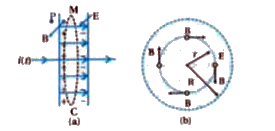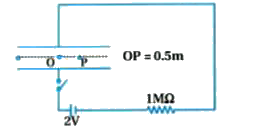Derive equation of missing term in Ampere circuital law. Write its definition and unit. Solution in Gujrati
We get different magnetic field inside and outside plates of capacitor by using ampere circuital law.
Hence some correction is to sought out in this law.
If area of plates of capacitor is A and charge is Q then electric field between plates of capacitor
E=σ∈0=QA∈0
where σ= surface of charge density =QA
This field will be normal to closed loop considered and its magnitude will be equal on area A of plate of capacitor and outside it will be zero.
Flux linked with closed loop inside capacitor can be obtained by Gauss.s law,
∴ΦE=→E.→A=EAcosθ
but θ=0∘
∴ΦE=EAcos∘=EA
∴ΦE=QA∈0.A=Q∈0 .....(1)
If charge on capacitor changes with time then corresponding current i=dQdt
Differentiating equation (1) with respect to time,
dΦEdt=1∈0.dQdt=i∈0
∴∈0dΦEdt=i

Thus by using ampere circuital law magnetic field inside and outside capacitor should be equal. For this in law total current i(t) should be replaced by ic+id then magnetic field in both part will be equal.
∴i(t)=ic+id=ic+∈0.dΦEdt
Ic is obtained due to flow of charge hence it is called conduction current.
id is obtained due to changing electric field hence it is called displacement current or Maxwell displacement current.
In any region product of permittivity ∈0 and rate of change of electric flux gives displacement current id.
SI unit of displacement current is ampere or coulomb/sec.
Thus, by writing i(t)=ic+id in Ampere circuital law.
∮→B.→dl=μ0ic+μ0id
=μ0(ic+id) where, i(t)=ic+id
This means that in region outside only conduction current ic is obtained ic=i(t) and displacement current id=0 and in inside capacitance ic=0 and current will be displacement current id=i(t).
Thus missing term in Ampere circuital law is id=∈0dΦEdt.
In broad sence law can be written as,
∮→B.→dl=μ0ic+μ0∈0dΦEdt
By using this law magnetic field can be obtained inside as well as outside capacitor.
Topper's Solved these Questions
- ELECTROMAGNETIC WAVESBOOK - KUMAR PRAKASHANCHAPTER - ELECTROMAGNETIC WAVESEXERCISE - SECTION A QUESTIONS - ANSWERS (TRY YOURSELF)
45 Videos
- ELECTROMAGNETIC WAVESBOOK - KUMAR PRAKASHANCHAPTER - ELECTROMAGNETIC WAVESEXERCISE - SECTION B NUMERICALS (Numerical From Textual Illustrations)
18 Videos
- ELECTROMAGNETIC INDUCTIONBOOK - KUMAR PRAKASHANCHAPTER - ELECTROMAGNETIC INDUCTIONEXERCISE - Section D MCQs (MCQs asked in Competitive Exams )
38 Videos
- ELECTROSTATIC POTENTIAL AND CAPACITANCEBOOK - KUMAR PRAKASHANCHAPTER - ELECTROSTATIC POTENTIAL AND CAPACITANCEEXERCISE - Section D ( MCQs asked in Cometitive Exams )
39 Videos
Similar Questions
According to Maxwell which is missing term in Maxwell's - Ampere circuital law ?
View SolutionA parallel plate capacitor with circular plates of radius 1 m has a capacitance of 1 nF. At t = 0, it is connected for charging in series with a resistor R=1MO¬a across a 2V battery. Calculate the magnetic field at a point P, halfway between the centre and the periphery of the plates, after t=10−3s. (The charge on the capacitor at time t is q (t) = CV [1 - exp (−t/τ)], where the time constant τ is equal to CR.)

View SolutionThree pure inductance each of 3 H are connected as shown in figure. The equivalent inductance of this connection between points A and B is ......

View SolutionCapacitance of a capacitor 100 μ F. The work is done for depositing chargc 8×10−18 C on it will be .........
View SolutionApplication Of Ampere Circuit Law
View Solutionऐम्पियर के परिपथिम नियम का गणितीय व्यंजक लिखें ।
View Solutionऐम्पियर के परिपथीय नियम का व्यंजक लिखिए। मैक्सवेल द्वारा इसके संशोधित रूप को लिखिए
View Solutionऐम्पियर का परिपथीय नियम लिखिये तथा इसे सिद्ध कीजिए।
View Solutionऐम्पियर के परिपथीय नियम को लिखिए । इसका उपयोग वायु क्रोड टोरॉइड के अंदर चुंबकीय क्षेत्र के लिए व्यंजक प्राप्त करने के लिए कीजिए यदि कुंडली की औसत त्रिज्या, उसके प्रति एकांक लंबाई में फेरों की संख्या तथा उसमें बहने वाली धारा 1 हो।
View Solutionऐम्पियर के परिपथीय नियम का गणितीय रूप लिखो |
View SolutionA: Ampere circuital law is not independent of the Biot- Savart's law.
R: Ampere's Circuital law can be derived from the Blot Savart law.
View SolutionWhat is the missing term in Ampere's circuital law?
View SolutionAmpere Circuital Law
View SolutionProblems on Ampere Circuital Law
View SolutionAccording to Maxwell which is missing term in Maxwell's - Ampere circuital law ?
View Solution
